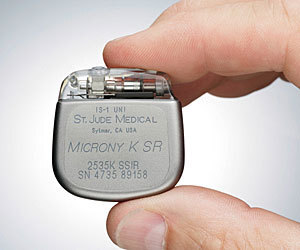by
Brendon Nafziger, DOTmed News Associate Editor | May 21, 2010

Recycling pacemakers
could save lives
in developing countries.
A literature review scanning nearly 35 years of research has concluded recycling pacemakers might help save some of the millions of people who die every year because they're too poor to afford the implanted medical devices.
In the meta-analysis of four studies conducted between 1975 and 2009, the researchers found no significant difference in complications, device failure or infection between implanting reused devices and new ones. The findings were shared Thursday at the American Heart Association Scientific Forum on Quality of Care and Outcomes Research in Cardiovascular Disease and Stroke held in Washington, D.C.
"Currently, when a patient expires, the technology is thrown away," Dr. Kim Eagle, professor of internal medicine at the University of Michigan Health System in Ann Arbor, Mich., and a co-author of the study, told DOTmed News. "We're trying to develop a program to reuse this in a safe and effective way."



Ad Statistics
Times Displayed: 123382
Times Visited: 7162 MIT labs, experts in Multi-Vendor component level repair of: MRI Coils, RF amplifiers, Gradient Amplifiers Contrast Media Injectors. System repairs, sub-assembly repairs, component level repairs, refurbish/calibrate. info@mitlabsusa.com/+1 (305) 470-8013
One to 3 million people die every year because they can't afford a pacemaker, according to Heartbeat International, a charity that donates (new) pacemakers supplied by the medical device industry. But the U.S. Food and Drug Administration considers the devices, which stimulate slow-beating hearts with mild electrical jolts, too risky to be reused after a patient's death.
But some recycling has occurred, largely in other countries. "There was a history of not U.S. reuse, but Canada, Sweden, some of the Scandinavian countries had programs in the '70s, '80s, then for reasons, probably legal or ethical or both, it was stopped," Eagle said.
Switzerland, India, Israel and France have also allowed pacemakers to be reused.
"Ironically, there was enough experience with it that one could study and verify that generally the devices were safe and effective," Eagle added.
The evidence from the current study corresponds with results from earlier research. Just last year, many of the same scientists who worked on the meta-analysis published a pilot study in the Journal of the American College of Cardiology. Coordinating with the charity World Medical Relief, they evaluated 12 sterilized, reused devices in patients in the Philippines. No functional problems were detected after several months of close supervision.
"They've done well," Eagle said.
Eagle and his colleagues now hope to run a large-scale clinical trial to monitor hundreds of patients after implantation with a recycled device. He said they are in talks with the FDA, and are waiting for its approval of the trials before starting.

